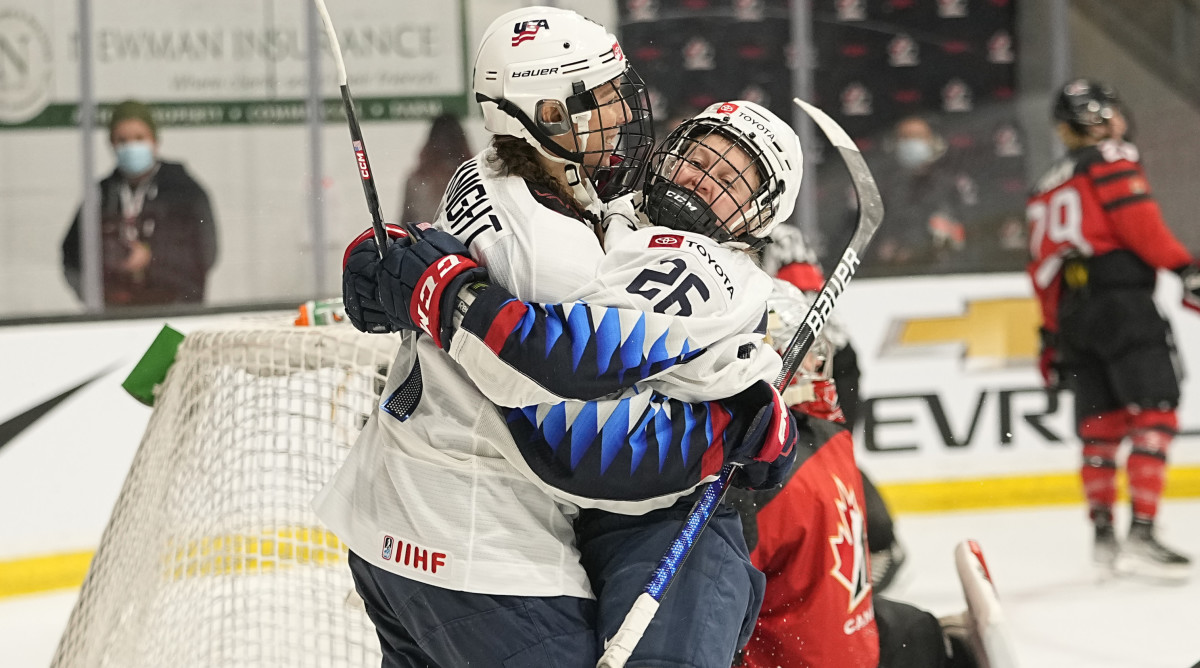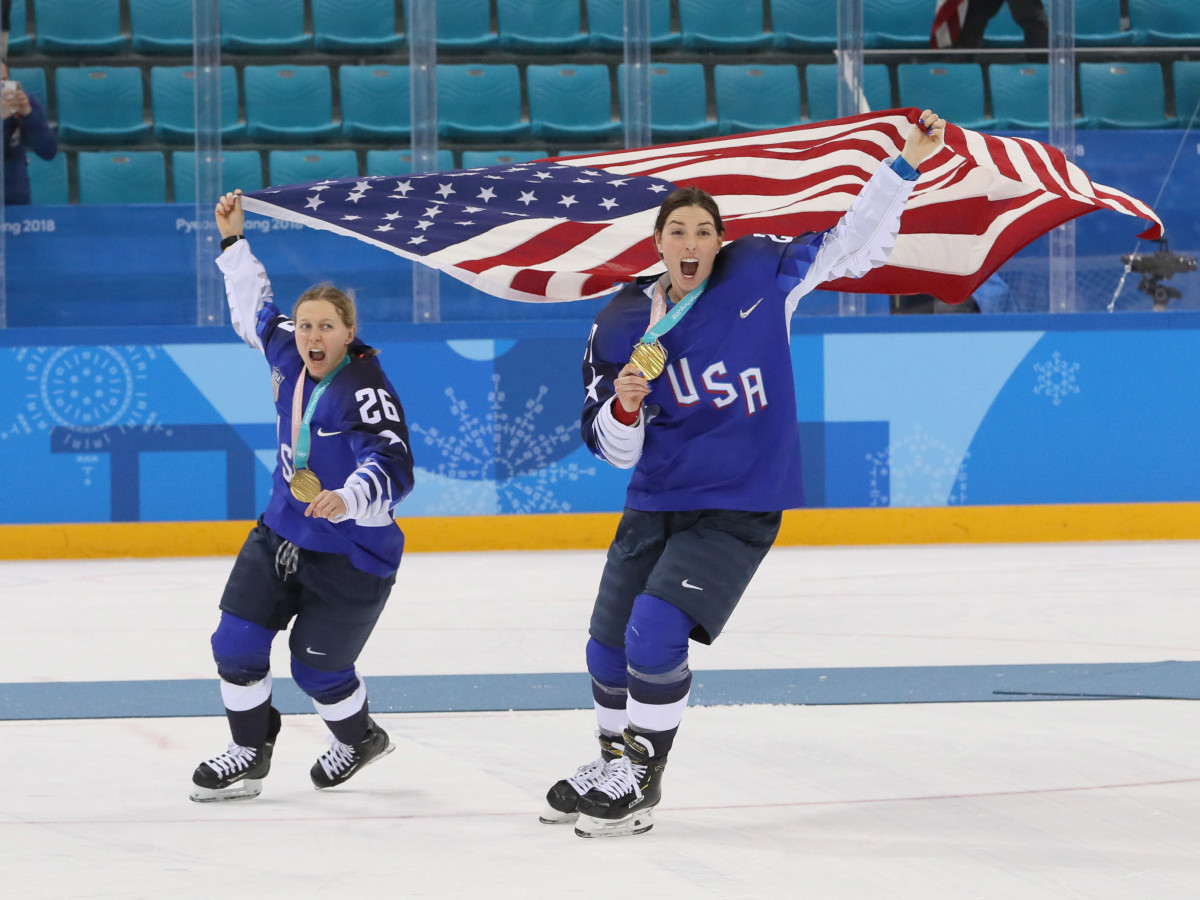U.S. Women’s Hockey Team Just Wants to Have Fun


BLAINE, Minn. — One day in early December, two months before the 2022 Winter Olympics, the U.S. women’s national hockey team hits the ice for practice with a purpose. A playlist of “Walking in a Winter Wonderland,” “Jingle Bell Rock” and other holiday classics blares over the rink speakers. A camera crew from NBC is on hand to capture the scene, as are several GoPros mounted atop Team USA’s helmets. During a 3-on-0 drill, players failing to score must stop, drop and log-roll as a pseudo-punishment, after which everyone inevitably pops up covered in snow and smiling.
This isn’t some anomaly, either. Pressure is certain to greet the defending gold medalists in Beijing when their repeat bid begins on Feb. 3 against world No. 3 Finland. It’s just that Team USA’s plan to fight back involves a few pokechecks to the funny bone. “We've tried to create a spirit of enthusiasm, of joy, of getting after it without taking ourselves too seriously,” coach Joel Johnson says after practice, sitting in a hallway at the national team’s Twin Cities training home. “Our goals are obvious. We're going to be measured based on the color of our medal. But we will not be defined by that.”
More likely is that the Americans’ success will be defined by the eight Olympic first-timers on the 23-woman roster—and how this group will rise to the challenge of replacing retired program stalwarts such as twins Monique Lamoureux-Morando and Jocelyne Lamoureux-Davidson, scorers of the tying regulation goal and the winning shootout goal against Canada in the 2018 final. Says Johnson, “That’s the unknown this group is living in, the awkwardness of certain people having been here when they won gold, and certain people—I played some songs today that came out when they weren’t even born.”
There are plenty of ways to measure the Team USA age gap, ranging from 19-year-olds Caroline Harvey and Abbey Murphy to Hilary Knight, 32, the team’s only four-time Olympian. For instance, Harvey lists her childhood idols as three current teammates: Knight, Kendall Coyne Schofield and Brianna Decker, who coached Harvey at two U-18 world championships as part of the U.S. staff.
“I remember my first senior team camp, sitting in a locker room with these girls,” says Harvey, a University of Wisconsin commit deferring her enrollment to chase some shiny hardware that would no doubt make for a sweet dorm decoration. “I was like, ‘Wow. I’m here with them. That’s crazy.’”
But the new guard is more than just along for the long ride to Beijing; rising stars like forward Abby Roque, whom Knight predicted was destined to become “the best player in the world, plain and simple,” will be counted upon to shoulder heavy loads at Wukesong Sport Center against Canada, Finland and other challengers. “Our team has definitely reset since the last Olympics, as far as different players, and it's been a good reset,” Decker says. “We have some younger girls who are incredibly talented.”
Equally impressive have been their abilities to gel with 2018 holdovers, both on the ice and off. “It's a good balance,” Decker says. “The younger players bring that excitement, and I think it’s important for us older girls to continue to do that as well. I’m someone who’s really dialed in before games, but I’ve definitely lightened up. It’s probably the best team I’ve been on, as far as just having fun.”

As Knight sees it, the resulting chemistry is downright electric. “I think we have that lightning-in-a-bottle thing,” the right winger says. “We've got an extremely motivated group that's unapologetic about how they're going to approach the future. That's what's intoxicating about this environment and what's so rare. You've got all these phenomenal people in one room, working towards a common goal.”
The road hasn’t been easy. There was last April’s abrupt resignation of former bench boss Bob Corkum, who explained the decision as a matter of him feeling “not comfortable” with the team’s pandemic protocols, and Johnson’s subsequent promotion. (“Bob’s a great coach,” Johnson says. “It hasn't been me that's filled the void—it's been our group.”) And the 2021 world championships, at which the U.S. finished second to host Canada, endured a three-month delay and a relocation before finally taking place in a strict bubble. “The challenge in Calgary was that we didn’t have a Wi-Fi bandwidth, so we couldn’t even really meet on Zoom,” Knight says. “Plus we had to quarantine longer than the men did for the world juniors, five days versus three. That’s a big difference. We were able to kind of figure it out. I don’t think anything really prepares you for those environments because they're so unnatural.”
But after consecutive home losses to rival Canada to kick off the My Why Tour, a series of border tilts leading up to the Olympics, Team USA had what Knight calls a “breakthrough” with back-to-back wins in Kingston, Ont., and Ottawa before Thanksgiving. “Sweeping Canada was big for us,” Harvey agrees. “We were connecting a lot better.” (The omicron variant later caused the cancellation of the tour’s final three games, after the Canadians had rebounded with two overtime wins in St. Louis in mid-December.)
The hope, of course, is that this lightning will spark another gold-medal run. No country outside the U.S. and Canada has won since women’s hockey was added to the Olympic program in 1998, with the Americans winning that year in Nagano and their rivals peeling off four straight prior to PyeongChang; the two have also combined to capture five of six silvers. And while Finland will look to spoil this North American dominance, piggybacking off its “Miracle in Espoo” triumph at the 2019 world championships, nothing less than a rematch of the 2018 PyeongChang final—and that of the most recent worlds in Calgary, where Canadian captain Marie-Philip Poulin struck the overtime winner—is expected next month.
In the meantime, Knight says, the key is to “appreciate those moments” together as the Games near. “It’s difficult,” she says. “Especially during COVID, I feel like we lost a lot of time to build that chemistry. And so we’re just making up for lost time.” Moments like when some daring prankster player hid a Timbits donut hole in the chafing dish of spaghetti and meatballs at the team hotel in Ottawa. “Looked exactly like a meatball,” Harvey says. “Our assistant coach Courtney Kennedy ate it, made a face, kept eating it, and swallowed it. Guess she just assumed it was a bad one. Everyone was dying.”
Or like a midwinter morning practice full of good vibes and joyful tunes. Then again, the U.S. players know they have a task at hand, too. That’s why, partway through practice, the Christmas music cuts off and gives way to the opening guitar chords of another song of Johnson’s choosing, this one with an even less subtle message: Bachman-Turner Overdrive’s “Takin’ Care of Business.”
More Hockey Coverage:
• Who Are Olympic Favorites Without the NHL?
• A First Look at the 2022 U.S. Olympic Men’s Hockey Team
• NHL Power Rankings: Making All-Star Picks for Every Team
